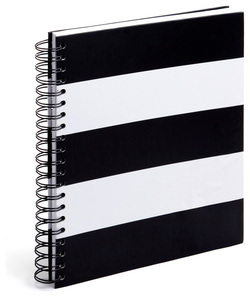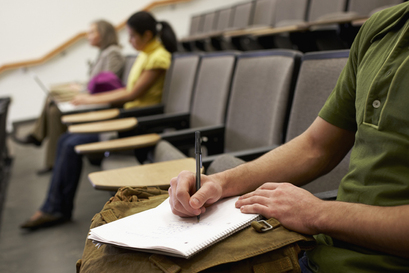Notebook and Pen > LapTop
But Jessica! My laptop lets me type everything my professor says quickly.
That's super. A pen and paper force you to listen for the important information, and only write down the immediately relevant parts, instead of typing everything verbatim.
Ok, but my laptop lets me record the lecture.
Cause you're really going to go home and re-watch the entire lecture all over again? Effective note-taking means getting what you need from class the first time around.
My handwriting is too messy.
I didn't do this, but I knew instructors who would deduct points for illegible assignments. Consider handwriting notes to practice improving your penmanship.
Zero Distractions
The thing is, your instructor gets it too. And knows you're not paying attention when you're giggling quietly, pointing at the screen, and whispering to the guy next to you. There's no way you're that into the lecture. Which means you're probably not listening very much at all.
By ditching the laptop, you remove the potential for distraction, and increase your listening and note-taking abilities. By being more present in class, you're more likely to need less review before major assignments and exams, because you digested the information the first time through.

What You Need
I also like notebooks with a more substantial cover that won't get shredded over the semester. Skip the yellow legal pads.
Inside, choose if you want wide-ruled or college-ruled paper; the latter's lines are more narrowly spaced.
Then, select the writing utensil of your choice. Pencil smears but you can erase. Pens can run out at inconvenient moments but are more easily readable. I'm partial to the Pilot G-2 05. I had to stop loaning my pen out during meetings, because people kept "accidentally" forgetting to return them.
Taking Good Notes
Here are my suggestions for effective note-taking:
1. Understand the point of the lecture and keep your notes focused.
If your professor is discussing the events leading up to the French Revolution, don't feel obligated to write down what he says about the time he saw an opera in Paris when he was doing research for his project on early 19th century French theater.
2. Have a consistent system of abbreviations, symbols, and short-hand.
It's fine for you to make up your own note-taking language. Just make sure YOU understand it.
3. Highlight anything your professor presents as "really important" / "key point" / "you will see this on the exam"
This way, when you prepare for a test, you can take a guess about what kinds of questions to prepare for.
4. Put a question mark next to points or words you do not understand.
If your instructor keeps saying something about the "Glorious Revolution" and you have NO IDEA what she is talking about, but nobody is stopping to clarify, put a question mark next to it in your notes and look it up later.
5. Organize your notes how it makes sense to you.
I'm not going to tell you to color-code your notebooks, folders, and pens, or use those little sticky tabs to highlight important pages. You figure out what works for you. I probably looked sloppy compared to some of my classmates because I usually used one (yep, just one) notebook for all of my classes. As in, go to Physics, take notes. Turn the page, go to a History course, and resume note-taking. It made sense for me, but it might drive others crazy. Do what makes you happy.
Chapman University also has a nice write-up on note-taking here.
What About My LaptOP?
Emphasis on Effective
Plus, if you're bored, you can sketch in the margins.





